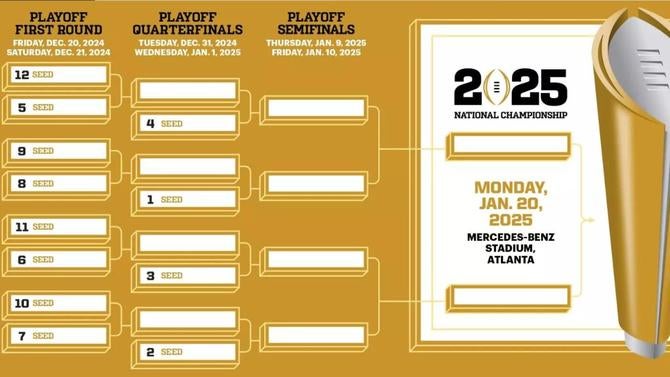
The expanded College Football Playoff debuts this week as 12 teams will do battle for the right to be called national champions. It will truly be a historic moment in the sport when the first-round action kicks off on Friday and tournament lasts all the way through to Monday, Jan. 20 at Mercedes-Benz Stadium in Atlanta.
The biggest change from the four-team bracket comes down to auto-bids. Previously, winning a championship would be a nice advantage. Now, five conference champions are guaranteed a spot in the CFP, and the top for of them get a first-round bye. Additionally, first round games will take place on college campuses.
With so many changes, let's have a look at how the 12-team College Football Playoff system will work.
How the 12-team bracket works
Step 1: Rank the top 25
The first step does not change compared to other seasons. The CFP Committee ranks the top 25 teams in the country. The criteria include strength of schedule, head-to-head competition, comparative outcomes of common opponents and any other relevant factors. This step remains the same in both the four- and 12-team systems.
Step 2: Seed the teams
When the CFP Rankings are complete, the committee seeds the bracket. They first identify the top four conference champions, which become the top four seeds, no matter where the teams are ranked.
Then, the CFP Committee will fill seeds 5-12 based on the top remaining teams in the rankings. One of the seeds must go to the fifth-highest-ranked conference champion. If that team is ranked lower than No. 12, it will receive the 12-seed.
Step 3: Create the bracket
The top four seeds receive byes to the quarterfinal rounds, while teams 5-12 face first round matchups at home stadiums of the higher-ranked teams. All future rounds will take place at bowl sites. The 1-seed will play the winner of the 8/9 matchup, 2-seed faces 7/10, and so on.
A team that plays in the first round must win four College Football Playoff games to capture the national championship. Teams with a first-round bye only have to win three games.
Here's what the bracket will look like.

Frequently Asked Questions
Can Notre Dame earn a first-round bye?
No, Notre Dame is permanently ineligible to earn a first-round bye or top-four seed as the program is unable to win a conference championship. The highest Notre Dame can possibly be is the 5-seed as the top at-large. Former Notre Dame athletic director Jack Swarbrick was part of the working group that originated the format. The Irish are comfortable with this setup.
Can the No. 12 team get pushed out?
Yes, a top 12 team in the rankings is not guaranteed participation in the playoff. In fact, if multiple conference champions sit outside the top 12 rankings, multiple teams that finish in the top 12 ranked teams could get left out.
Do conferences have any auto-bids?
No, there are no specific auto-bids that are tied to conference affiliation or based on being in a power conference. If the top five conference champions are all from the Group of Five, so be it. In 2020, for example, the Pac-12 champion USC ranked behind Sun Belt champ Coastal Carolina and AAC champ Cincinnati. In that scenario, the conference would have been left out of the field completely.
Is there reseeding?
No. The bracket is set in stone when the CFP Committee puts it together.
When are College Football Playoff games?
- First round: Dec. 20-21 on home campuses
- Quarterfinals: Dec. 31-Jan. 1, 2025
- Semifinals: Jan. 9-10, 2025
- CFP National Championship: Jan. 20, 2025
Does Army-Navy count towards the CFP?
No. Because the game takes place after selection day, the game will not be taken under consideration by the CFP Committee. Both schools and the AAC agreed to this stipulation.
How are locations chosen?
The first round will take place at the home stadium of the higher-ranked team. Schools also reserve the right to move home games to neutral sites if preferred. Bowl sites will be chosen in consideration of historic bowl relationships, then in consideration of rankings. For example, if the Sugar Bowl hosts a Playoff Quarterfinal and the SEC champion is ranked No. 1 and the Big 12 champion is ranked No. 3, the SEC champion would be assigned to the Sugar Bowl and the Big 12 champion would be assigned elsewhere.
















